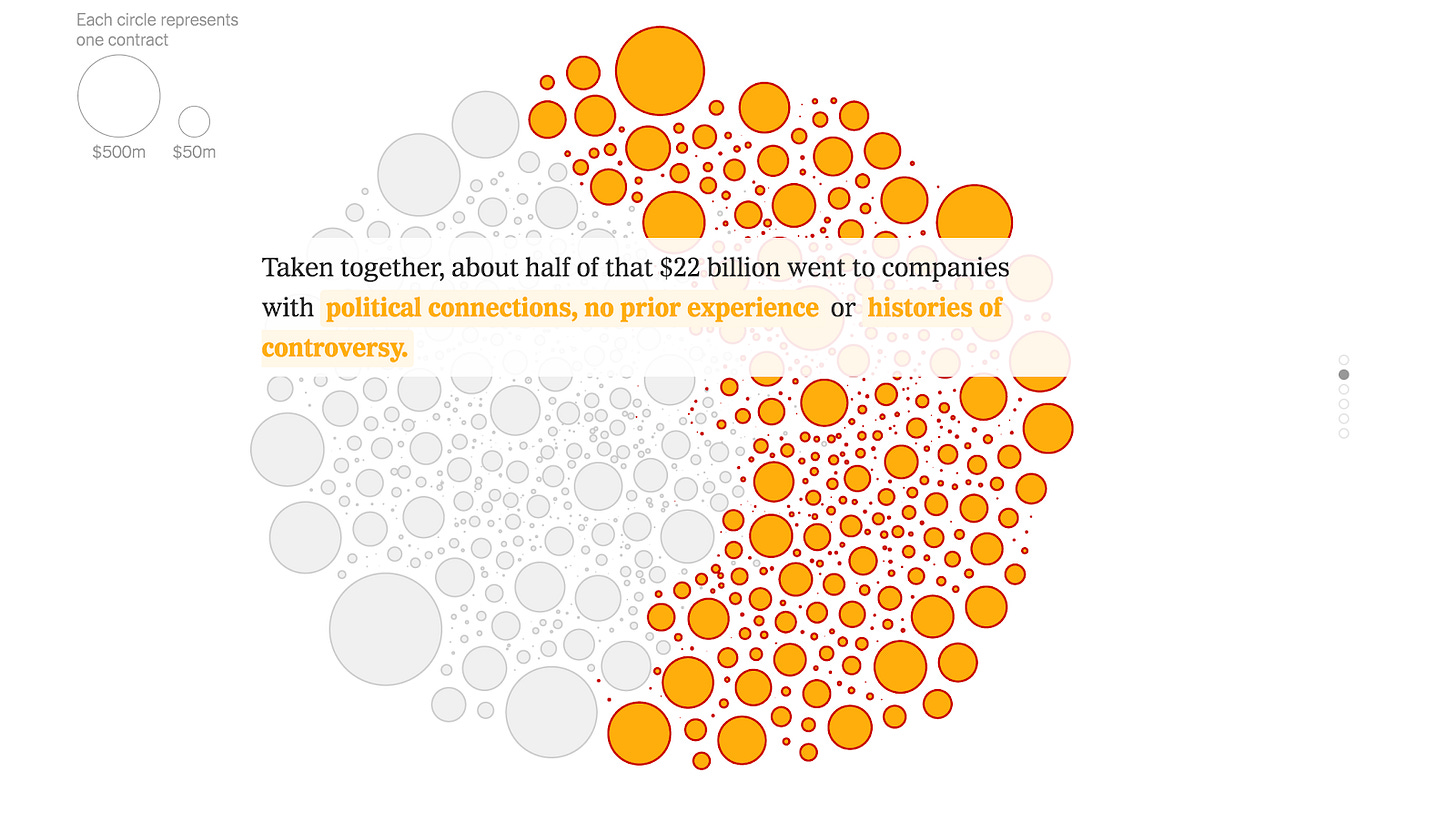Contracts, Data and Investigations: Edition 2020-12-18
This week’s content: Your favorite data-driven investigation; waste, negligence, and cronyism in the UK; US COVID relief spending tracker; purchase orders in Chile
This newsletter gathers stories covering the use and abuse of government contracts during the COVID-19 pandemic and beyond. We’d really be happy about a like, and let us know about your stories and content. We’d love to hear about them.
We asked you last week: what were the most eye-opening investigations of 2020? Here’s what you said.
A Bosnian raspberry farm scored a contract for ventilators, the OCCRP’s Zdravko Ljubas revealed in April.
In June, the US paid millions for test tubes that turned out to be useless soda bottles. The supplier was formed just six days before getting the contract, reported ProPublica’s David McSwane.
The Guardian’s David Pegg, Felicity Lawrence, and David Conn have been tracking emergency contracts throughout the pandemic. But this story from November may just sum it all up. A “high-priority lane”, or VIP lane, was established for firms providing PPE services that had been referred by officials, ministers’ offices, MPs, peers, and senior NHS staff in the UK. The success rate was about one in ten awarded contracts compared with one in 100 for those going through the normal process.
Calls to offer help have been a regular scheme. One of the most brazen ones was that of a Turkish salesman offering PPE that got picked up by a Royal Air Force plane from an Istanbul airport and turned out to be useless, the Telegraph’s Bill Gardner reported in May.
The impact of the pandemic and public contracts collide in the need to purchase body bags. Prosecutors in Ecuador identified a criminal ring in May that had colluded with health officials to win a contract selling body bags to hospitals at 13 times the real price.
Finally, the power of collaboration was visible in the investigations by the Latin American network Red Palta. The latest report in their month-long investigation showed the possibilities of cross-regional reporting based on open contracting data. It found that Chinese companies dominate the market for rapid COVID-19 tests in Latin America. Led by Ernesto Cabral at Peru’s Ojo Público, working with Poder, Mexico, Datasketch, Colombia, Ojo Con Mi Pisto, Guatemala, and La Nación the investigation revealed that 76 Chinese labs sell tests in Latin America and 93% are not certified in their country of origin. Check out the full series #ComprasPandemia here.
Visualizing UK’s $22 billion in emergency contracting: The New York Times’ Jane Bradley, Selam Gebrekidan, and Allison McCann dug into the scramble to procure personal protective equipment, ventilators, coronavirus tests – summarizing the cronyism, waste, and poor due diligence and visualizing the extent of the problems.
The Guardian’s Rob Evans and David Conn find that a consultancy co-founded by the pollster who headed the Conservative party’s general election campaign was given a £124,000 no-bid contract, one of the many examples of contractors with ties to the governing party.
The UK government has published a Green Paper on public procurement regulatory reform. We welcome the proposals to embed transparency by default for the full procurement process and the requirement for all contracting authorities to implement the Open Contracting Data Standard. The test will be whether it survives without being watered down. Gill Plimmer, Jim Pickard, and Anna Gross report on the shake-up for the Financial Times and consultation on improvements in the process for emergency procurement.
Tracking spending: Civil society organization POGO has published a COVID relief spending tracker, including the full range of grants, loans, contracts, and other awards disclosed by the government. Caitlin MacNeal and Neil Gordon explain where the money went, finding that by September, the US government had awarded $26.6 billion in contracts, with just 18% of that total spending going to businesses owned by women or people of color.
Backtracking in New York City: In an analysis for the New York Times, Michael Rothfeld and J. David Goodman write on New York City’s efforts to claw back some of the money spent on deals early in the pandemic.
Tracking the temperature: As we shift to the delivery of the vaccine, we see the need for new services. Next Gov’s Frank Konkel reports on a $25 million sole-source contract to monitor vaccine temperatures in the US. At the same time, the global plans to deliver a vaccine to poor countries is under stress, Francesco Guarascio writes for Reuters. Lack of funds, supply risks, and complex contractual arrangements could make it impossible for COVAX to achieve its goals. And thanks to Belgium’s secretary of state, we now know what the EU is paying for the vaccines, Politico EU reports.
Aaron Saltzman of CBC news provides a rare analysis of Canada’s spending during the pandemic, finding that companies with little or no experience got some of the biggest contracts.
In Ireland, Cianan Brennan reports for the Irish Examiner on a €14.1m deal to an Irish events management company to import medical ventilators and other supplies for use in Irish hospitals from China. The ventilators were never used due to "issues with the quality."
A carousel: Cuestión Pública investigates a potential public contracting scheme among five companies divvying up health contracts from public hospitals in the city of Cali, Colombia. Three of them were registered under the same address.
Tracking purchase orders: Chile’s Observatorio Fiscal has published a new report analyzing whether the purchase orders tracking actual contract execution were published. The analysis looked at data over the last decade and finds that for 6.5%, or more than 130,000 contracts, there were never any purchase orders, especially at the municipal level.
***
We’ll be on a holiday break until January. Thanks for reading and coming along.
Get some rest, but keep your eyes open: tenders and contract awards are still being published at the end of the year – a classic technique to keep them from the public’s view. For more tips, check out our Idiot’s Guide to Looting Public Procurement.
***
For our recommendations, resources and tools, check our COVID-19 resource page. Our friends at the GIJN have pulled together some tips and tricks for investigating public procurement. This newsletter has been put together by the Open Contracting Partnership. Comments? Suggestions? Got a story you’ve written to share? Write to Georg at media@open-contracting.org. Thanks for reading.
Did a friend forward you this email? Click here to subscribe.



